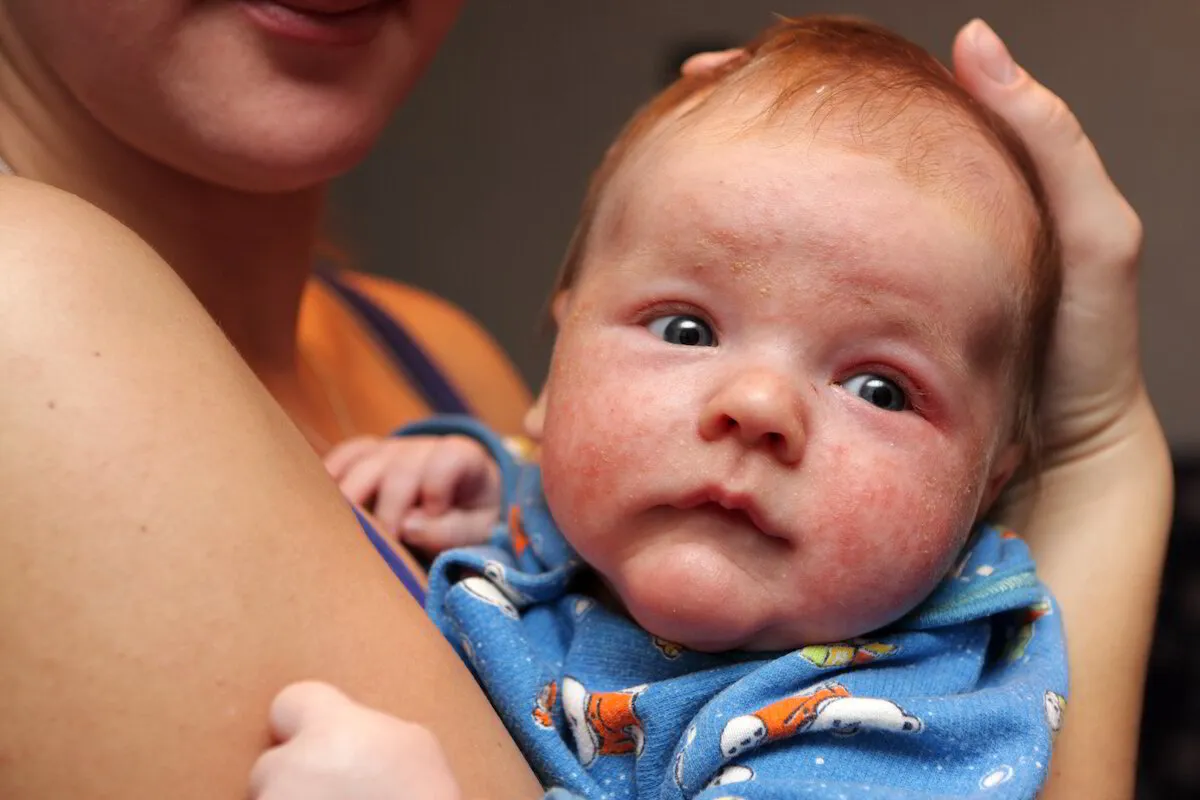Hi Dr Bean, My question is related to my daughter’s eczema. She’s 20 months old, and has severe eczema since the last 6 months. Her skin flares up into red and flaky and if untreated turns into secondary infection. We have tried all medication, including steroid creams, gluten/dairy free diet, probiotics, oatmeal shower but nothing seems to be working. She is now on anti histamine which have calmed her condition but do not intend to continue this over a long term. She’s clearly uncomfortable, cranky and we are at this point struggling to find a solution. Any guidance from you will be much appreciated. Thanks
This is such a great question because I see atopic dermatitis (eczema) a lot in my clinic. Eczema is a common skin condition affecting up to 20% of children. The exact cause of eczema is not known. However, if there is a family history of eczema, asthma or hay fever then your child is more likely to develop one of these conditions.
Some common triggers
– Arid climates
– Irritants: wool, synthetic clothing, soaps, detergents)
– Microbial colonization/infection
– Environmental: climate extremes, tobacco smoke, traffic exposure, hard water
– Inhalent allergens: dust mites, tree and grass pollens, molds, animal dander
– Food sensitivities and early food introduction are big culprits (early would be sooner than 4 months. It is recommended to start around 7 months). 35-40% of children with eczema have food allergies. Eggs are the most common sensitivity along with milk, peanuts, soy, wheat, fish, shellfish, tree nuts and citrus fruits – all accounting for 90% of food allergies in eczematous children.
– Possible tiggers: Anxiety and stress, c-section, maternal prenatal asthma.
DOES IT EVER GO AWAY?
The good news is that approximately 50% of children will no longer be troubled by eczema by the age of 2 and 80% cent by the age of 5. The bad news is there is no cure for eczema, although there are many ways to investigate the cause, reduce occurrences, and control the ‘dis-ease.’
SIGNS & SYMPTOMS
Eczema is a red, hot, dry and itchy rash that can affect one or many areas on the face and body and it can be mild, moderate or severe. There are often scratch marks on the skin because of the itch. These areas may become infected with bacteria and this can worsen the eczema.
PREVENTION
Babies are born to breastfeed! Breast milk contains over 100 substances not found in formula but are vital to normal development and function of your child’s immune system. Breast milk contains gamma-linoleic acid that is particularly important for babies with a family history of eczema. Recent trials have found that breast fed babies have reduced or delayed incidence of atopic diseases such as eczema, allergies and asthma and conclude that eczema tends to occur more in bottle-fed babies.
THINGS TO CONSIDER
A survey of 506 patients with eczema had deterioration in the winter and improvement in the summer. Dry itchy winter eczema may be worse due to centrally heated homes, lack of circulation and air to the skin, and heavy winter clothes. Inherited eczema may be related to a disturbance in essential fatty acid metabolism and the over-consumption of refined foods and saturated fats. It also is important to consider the implications of cow’s milk as food for babies. Cow’s milk protein are large molecules not easily digested by the baby’s gut and not only causes skin problems but can lead to inflammatory bowels and respiratory airway inflammation.
TREATMENTS
– Address food allergies and use elimination diet challenges to find out what foods are causing your baby’s eczema is important for the long-term health of your baby.
– If family inheritance plays a role there are essential fatty acids (evening primrose oil, borage and black currant seed) that address certain enzyme deficiencies common to Northern European descendants.
– Improving your environment by removing dust mites from the home, washing linens weekly in hot water, avoiding carpeted bedrooms and adding a humidifier to combat dry air can all help.
– Herbs are used to support the immune system and reduce inflammation.
– Oat bath for about 15-20 minutes daily. It is important to dry off completely and immediately coat the skin with a naturally based emollient cream or ointment. Because eczema predisposes your baby’s skin to weakness, it is less able to retain water and can cause shrinking and cracking of the skin. Bathing, followed by an emollient of olive oil & aloe vera gel or castor oil and witch hazel are good options.
– As a moisturizer for dry skin, sesame oil or almond oil with a few drops of essential oils of chamomile or neem can help soothe inflammation. I use chickweed cream with my patients to help reduce inflammation
– Breast feeding mother: high quality omega 3
– NAETs – desensitization technique
– Homeopathy – this has been pinnacle in my office in helping resolve eczema

